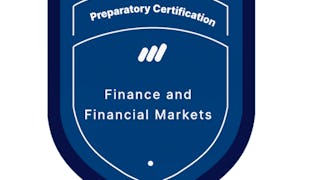![[Featured Image] A smiling certified bookkeeper holds a pen and tablet as she talks to her colleague across the table.](https://images.ctfassets.net/wp1lcwdav1p1/7kprfWVxieI7exVIsHWKSK/0ebce6388b73fe8c199a4b5a7dcd7299/GettyImages-1255954062.jpg?w=330&h=216&q=60&fit=fill&f=faces&fm=jpg&fl=progressive)
What Does a Certified Bookkeeper Do, and Do You Need One?
Discover the role and responsibilities of a certified bookkeeper, and find out why you may need to hire one to ensure your company's finances run smoothly.
October 2, 2024
Article
Discover an array of rewarding professions in finance. Whether you're passionate about crunching numbers, decoding data trends, or architecting a company's financial future, there's a place for you. Get started with our these free resources.

Explore finance courses and certificates

Yale University
Skills you'll gain: Investment Banking, Risk Management, Financial Market, Financial Regulation, Financial Services, Finance, Business Risk Management, Securities (Finance), Financial Policy, Enterprise Risk Management (ERM), Capital Markets, Behavioral Economics, Banking, Corporate Finance, Governance, Investments, Insurance, Underwriting, Derivatives, Market Dynamics
Beginner · Course · 1 - 3 Months

University of Pennsylvania
Skills you'll gain: Return On Investment, Capital Budgeting, Financial Modeling, Financial Analysis, Financial Planning, Corporate Finance, Business Valuation, Financial Management, Asset Management, Cash Flows, Risk Analysis, Cash Flow Forecasting, Working Capital
Mixed · Course · 1 - 4 Weeks

Corporate Finance Institute
Skills you'll gain: Environmental Social And Corporate Governance (ESG), Financial Statement Analysis, Annual Reports, Mergers & Acquisitions, Income Statement, Financial Statements, Financial Analysis, Business Valuation, Banking Services, Credit Risk, Loans, Capital Expenditure, Corporate Finance, Banking, Accounting, Capital Markets, Enterprise Risk Management (ERM), Balance Sheet, Financial Trading, Wealth Management
Beginner · Specialization · 3 - 6 Months
Finance plays a fundamental role in strategy formation, operations management, marketing decisions, and human resources structure. A career in this fast-growing field provides opportunities to use technical skills to drive meaningful business impact. Explore the diverse career paths, essential skills, and job types within finance to start your journey in this exciting and rewarding field.
Interested in business strategy? Find out more about business forecasting and consider a business strategy specialization..
Interested in business administration? Read our guide to business administration degrees or consider a course in business administration.
Interested in finance? Learn more about finance management, or look into entry-level finance jobs.
Ready to start learning? Explore our catalog of business finance, business metrics, and financial analysis courses for beginners and experienced professionals.
Artificial intelligence in finance courses cover a variety of topics essential for understanding and applying AI technologies in the financial sector. These include the basics of machine learning, neural networks, and data analytics. Learners will explore topics such as algorithmic trading, credit scoring, and risk management using AI. Advanced courses might cover areas like natural language processing for financial analysis, robo-advisors, and fraud detection. Practical exercises and projects help learners apply these concepts to real-world financial scenarios, enhancing their ability to develop and implement AI-driven financial solutions.
Yes, absolutely. Coursera offers many courses in financial management topics as well as related business topics such as accounting, investment, and financial markets. You can learn remotely from top-ranked schools like the University of Illinois at Urbana-Champaign and the University of Virginia, so you won’t have to sacrifice the quality of your education to learn online. Indeed, you’ll be completing the same coursework and working with the same faculty as on-campus students at a lower tuition. No matter the current stage of your education or career, that’s a smart financial management decision.
Employers increasingly value continuous learning and skill enhancement. Completing a beginner's Finance course could enhance job applications or may open other career opportunities. Enrolling in a beginner's Finance course is a step forward in your professional journey!